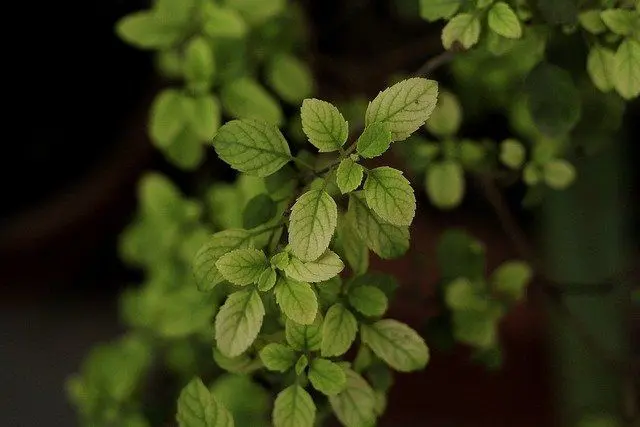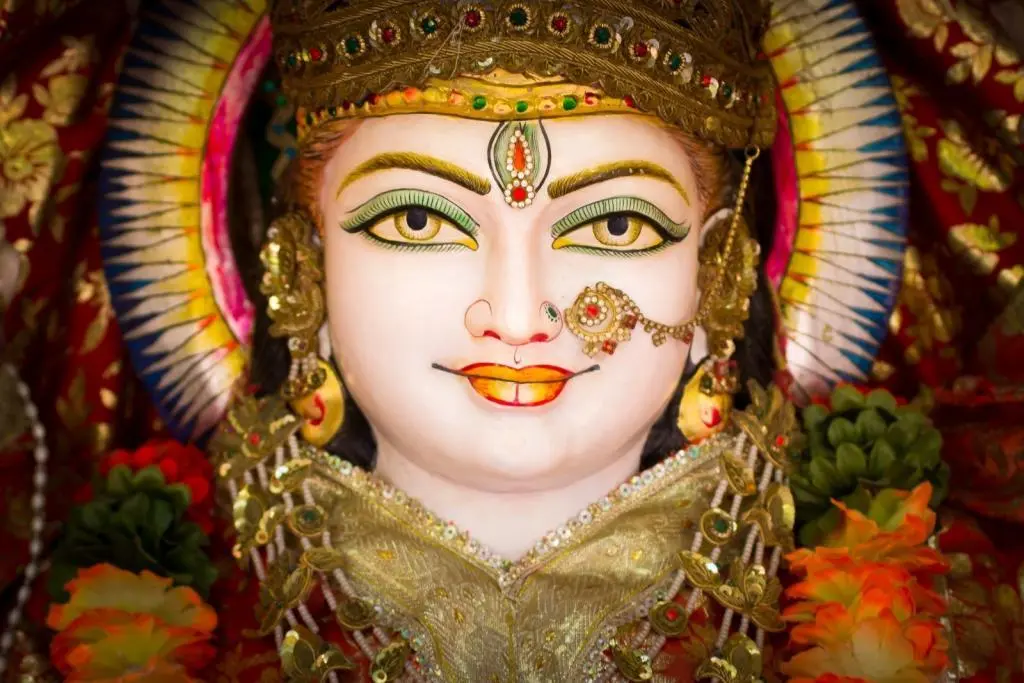Many people wonder why do Hindus worship Tulsi as it is just a small plant. There are multiple reasons behind this belief. Tulsi (Holy basil) or Tulasi is the most sacred plant in Hinduism. The word Tulsi in Sanskrit means “incomparable” or “matchless”. It has numerous medicinal uses and health benefits. You would find a Tulsi plant in front of almost every Hindu house. Hindus celebrate Tulsi Vivah (the marriage of Tulsi) every year in the Kartik month (the eighth month of the Hindu calendar), where a wedding between a Tulsi plant and a Shaligram stone (a form of Lord Vishnu) takes place. It is not just a plant for Hindus but is like a goddess.
Why do Hindus Worship Tulsi?
1. Because of Lord Vishnu’s boon to Vrinda, she achieved the status of a goddess.
The story of Tulsi is very interesting as well as controversial. There are at least two versions of this story.
Once upon a time, there was an Asura named Shankhachuda, who was very powerful. Apart from his powers, he had protection from his wife, Vrinda, who was very virtuous. She was also a great devotee of Lord Vishnu. Once there was a war between gods and Asuras, but gods were unable to win it because the spiritual power of Vrinda was protecting Shankhachuda. It was necessary to break her chastity to kill him.
(Per the Shiva Purana, Vrinda was the wife of Jalandhar).
Therefore, Lord Vishnu in the disguise of Shankhachuda approached Vrinda, who was preparing a ritual to marry her husband again so that it would be impossible to kill him. He told her that he had defeated the gods and won the war. Vrinda did not recognize Lord Vishnu in the disguise of her husband and married him. It broke her chastity, and the gods were able to kill Shankhachuda.
(According to some texts, Lord Vishnu slept with her, but she recognized that he is not her husband during the coitus from her experience).
Vrinda’s curse to Lord Vishnu:
After this, Lord Shiva was able to kill Shankhachuda. Then Lord Vishnu appeared before her in his real form, and Vrinda realized the deceit. She also came to know that her husband was no more and the gods had killed him. It infuriated her, and she cursed Lord Vishnu that he would turn into a stone. He accepted her curse wholeheartedly and told her the real story from the past life of her husband and why he had to kill him. Afterward, Vrinda repented for cursing her beloved god and apologized. But as she could not live without her husband, she decided to self-immolate.
Pleased by her devotion, Lord Vishnu gave her a boon that from her ash the plant Tulsi would be born and the plant would get married to Shaligrama (the cursed stone), which is Lord Vishnu himself. He also told her that he would not accept any offerings without Tulsi leaves. That is why Hindus celebrate Tulsi Vivah every year and worship the Tulsi plant.
2. Per some Hindu scriptures, Tulsi is an incarnation of the goddess Lakshmi.
Goddess Lakshmi is one of the three major Hindu goddesses. Hence, an incarnation of her is highly revered and treated like a goddess.
3. A Tulsi plant releases ozone for a few hours a day.
Tulsi plant releases oxygen for twenty hours and ozone for four hours a day, although some people don’t agree with it. Shyamkant Godbole, an eminent botanist, studied the environmental benefits of Tulsi and found that it indeed releases ozone.
4. The Tulsi plant has many medicinal uses and is called the “Queen of the Herbs”.
The following paragraph has been borrowed from a research article. You can read it here.
“There is mounting evidence that Tulsi can address physical, chemical, metabolic, and psychological stress through a unique combination of pharmacological actions. Tulsi has been found to protect organs and tissues against chemical stress from industrial pollutants and heavy metals, and physical stress from prolonged physical exertion, ischemia, physical restraint, and exposure to cold and excessive noise. Tulsi has also been shown to counter metabolic stress through normalization of blood glucose, blood pressure, and lipid levels, and psychological stress through positive effects on memory and cognitive function and its anxiolytic and anti-depressant properties.
Tulsi’s broad-spectrum antimicrobial activity, which includes activity against a range of human and animal pathogens, suggests it can be used as a hand sanitizer, mouthwash, and water purifier as well as in animal rearing, wound healing, the preservation of foodstuffs, and herbal raw materials and traveler’s health. Cultivation of tulsi plants has both spiritual and practical significance that connects the grower to the creative powers of nature, and organic cultivation offers solutions for food security, rural poverty, hunger, environmental degradation, and climate change. The use of tulsi in daily rituals is a testament to Ayurvedic wisdom and provides an example of ancient knowledge offering solutions to modern problems.”
Other Uses of Tulsi:
1. Reduces cold, cough and helps with other respiratory diseases.
2. Helps relieve acidity.
3. Insect repellent.
4. Helps reduce fever.
5. Immunity booster.
6. Antibacterial properties.
7. Anti-cancer properties.
8. Helps control blood sugar and blood pressure.
9. Aromatic.
10. Useful in kidney stones and arthritis.
11. Useful in GI disorders.
5. Tulsi plant eliminates Vastu dosha and, to some extent, repels black magic also.
The different parts of Tulsi are the abode of various Hindu gods and goddesses. Hindus lit a lamp on Tulsi Vrindavan and circumambulate it daily. The untimely death of the plant is inauspicious.
6. Hindu sages knew the importance of this valuable herb and created a way to protect it even in worse conditions.
Hindu sages were actually scientists to some extent and knew the importance of the Tulsi plant for both health and environmental purposes. Therefore, it is quite possible that they created some stories around it and made it an integral part of Hinduism. The status of a goddess protects the plant from unnatural damages. The meaning of the word Tulsi is self-explanatory.
If you know anything more about “Why do Hindus worship the Tulsi plant?”, please feel free to use the comment section.






